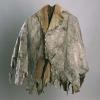Quilt No.25WAM - Western Australian Museum
The cloak is from Jerramungup in South West Western Australia, and came into the Western Australian Museum c.1922. It was donated by S.J. Tunney.
[E8456].
Skin cloaks were termed 'booka'. They were made from the skins of kangaroos, possum, sometimes also the Brush Wallaby. The number of skins used to make a cloak varied, depending on the size of the skin and the size of the wearer. The literature states that Aborigines preferred the skins of female kangaroos as they were softer and lighter. Women's cloaks, however, were bigger, and were probably made from the skins of male kangaroos, which were larger.
The skins were pegged out to dry and the flesh scraped off, either with a piece of sharp stone, such as quartz, or with the woman's knife, which was a piece of quartz, glass, or a kangaroo tooth, attached to a stick with gum. The skin was rubbed with grease to make it pliable; red ochre or ashes were sometimes rubbed on the skin while it was being prepared. The holes for sewing the skins together were made by a pointed stick or pointed bone, and they were joined using kangaroo tail sinews or rushes.
From the literature it appears that women were responsible for preparing the skins and making the cloaks, although one source says men prepared the skins.
The cloaks were apparently worn with the fur to the inside, but in wet weather the cloaks were worn fur side out, so rain would run off the fur and not penetrate. Contemporary illustrations show that men wore the
cloaks so that one arm was left free, to carry weapons etc.
[Ref: S. Meagher MA Thesis 1973 'A Reconstruction of the Traditional Life of the Aborigines of the S.W. of Western Australia']






